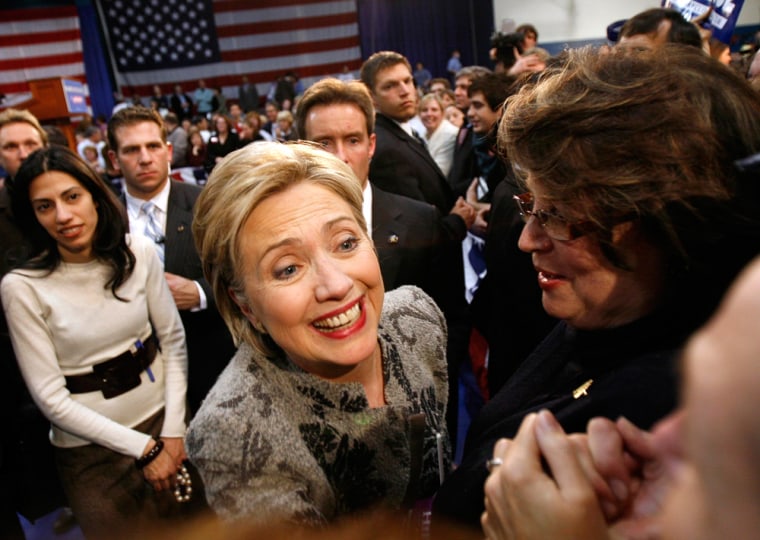It was almost as if the candidates were running for president of two different countries. Exit polls showed that rather than reaffirming Iowa's results from five days earlier, New Hampshire voters had their own thoughts about the contenders and the issues.
Of the two parties' victors in New Hampshire on Tuesday, Hillary Rodham Clinton did better than she had last week in Iowa among women, independents and late deciders. On the Republican side, John McCain — who had campaigned sparingly in Iowa — soared among virtually all categories, dwarfing chief rival Mitt Romney on experience, authenticity and other areas.
Most telling was Clinton's performance.
The New York senator went from narrowly losing the women's vote in Iowa to Barack Obama to swamping him in New Hampshire among females, 46 percent to 34 percent. Women had been the anchor of her support in national and regional polling for most of the past year, and she had seemed in danger of springing a leak in her major constituency. This was crucial, since females usually comprise more than half those who vote for Democrats across the country.
'I think she's got the clout'
Independents were a strength for Obama, the young senator from Illinois, who won 41 percent of them in both Iowa and New Hampshire. But while Clinton attracted less than one in five of them in Iowa, she garnered nearly a third of independents in New Hampshire, eating into his advantage.
"I think she's human. I think she's got the clout," said Joyce Connelly, 76, an independent from Laconia, N.H.
That was important because independents were more than four in 10 of those who voted in the New Hampshire Democratic contest — double their portion in Iowa.
People who chose their candidate in the final three days were also kinder to Clinton in New Hampshire, where she and Obama each got more than a third of their vote. In Iowa, the late-deciders had favored Obama by 33 percent to 22 percent.
As if to reaffirm the late decision-makers, about three-quarters of Democrats said the weekend's debates — which included moments when Obama and former North Carolina Sen. John Edwards both took her on — played a role in picking a candidate. She had a slight edge over Obama in that group, while the two were about even among those who said the debates were not very important.
Clinton also showed improvement between the two states among people earning less than $50,000 annually. And while Obama had a healthy 51 percent to 28 percent lead over her among under-30 voters, that was less decisive than the 57 percent to 11 percent advantage he held over her with that group in Iowa.
Different race for the GOP
As expected, the Republican race was completely different in New Hampshire than in Iowa, where there were roughly three times as many voters who considered themselves born again or evangelical. That group had helped Mike Huckabee, the Baptist minister and former Arkansas governor, to a victory there.
Romney finished second in both states, but with many categories of voters actually did better in New Hampshire than he had in Iowa. It's just that McCain, who had made little effort in Iowa, did even better than Romney.
Romney, the former Massachusetts governor, went from support of about a quarter of Iowa conservatives to more than one-third in New Hampshire. But that didn't help him much, because there are many fewer conservatives in New Hampshire.
GOP voters picked illegal immigration as the campaign's major issue, and Romney got three in 10 votes from them, losing narrowly to Huckabee in that category. In New Hampshire, Romney got more than half the votes of those worried about immigrants, though the number calling it the top problem shrunk from a third in Iowa to less than a quarter in New Hampshire.
Romney did roughly the same — or better — in New Hampshire than Iowa among people most concerned about three other issues: the Iraq war, the economy and terrorism. But McCain got the support of four in 10 of those voters, better than any other candidate had done on those issues in Iowa.
On the qualities GOP voters were looking for in a candidate, Romney won among those in New Hampshire looking for shared values — better than he did in Iowa. But McCain beat him badly with those seeking experience and a straight shooter — even though Romney did about as well in those areas with voters in both states.
